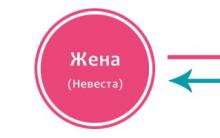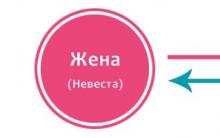The first results of the work of the "daughter" of the Central Bank - the Russian National Reinsurance Company (RNRC) led to friction. Insurers complain that RNRC requires too much information, and the reinsurer does not like the quality of risks.
Photo: Sergey Malgavko / RIA Novosti
A large-scale project to create the RNPK was implemented by the Central Bank in short time- in six months in 2016, we managed to convince the deputies to pass a law on such a company, staff it and obtain a license. This was the authorities' response to the inability of Russian commercial insurers to provide protection to large clients subject to sanctions: for example, the construction of three nuclear icebreakers United Shipbuilding Corporation (USC). Western companies have denied our insurers their capacity for such risks. Last October, the state-owned company received a license, declared authorized capital - 71 billion rubles, paid-in authorized capital - 21.3 billion rubles. The company is already making a profit, however, so far mainly due to investment income.
First results
In January-March 2017, RNPK's net profit amounted to RUB 435 million. The company hopes to make a profit from insurance activities by the end of the first half of the year. In the first quarter, the accrued premium amounted to RUB 1.3 billion. under 1,313 contracts, 66% of premiums were for property insurance of legal entities, 12% for insurance of business and financial risks. In the first quarter, 40 losses were reported in the amount of about 93 million rubles. According to RNPK President Nikolai Galushin, in 2017 the company plans to raise 7.5 billion rubles. premiums and make a profit of 2.7 billion rubles.
Tithing RNPK
Since January 1, 2017, the activities of the RNPK provide for the so-called cession - the transfer of a company from the market of 10% of the sanctions risk. RNPK is obliged to accept this volume of business.
For other risks, insurers were obliged to offer RNPK 10% of the entire business they transfer to reinsurance, while the company has the right to decide whether to take them and in what amount.
The share of the sanctions business in the RNPK portfolio in January-March amounted to less than 5% of the total volume of premiums. “This figure does not mean anything, since the bulk of reinsurance contracts are concluded closer to the end of the year,” Nikolai Galushin, President of RNPK, explains the result. It will be possible to estimate the share of the sanctions business in the RNPK portfolio and in the insurance market only in 2018, when all reinsurance contracts will be included in the scope of the law on a mandatory 10% assignment. Earlier, the All-Russian Union of Insurers (ARIA) calculated that the volume of business under sanctions could bring insurers about 5 billion rubles. premiums per year, of which, according to RNPK calculations, about 1.5 billion rubles. a year will go to her.

The first quarter of RNRC's work confirmed market expectations: due to sanctions risks, the company's capacity turned out to be in demand in excess of the mandatory 10% cession, says one of the major insurers, who asked not to be named. In such cases, RNRC has the opportunity to apply its own underwriting policy to the risk assessment. That is, RNRC can independently assess the risk, but it does this in one case - when the direct insurer does not have answers to RNRC's questions on risk. “However, such a policy (risk assessment) is not yet clearly defined and is not always clear to insurers, which is the main difficulty,” complains one of the insurers.
“Of course, we are taking advantage of the opportunity that the RNPK gives us in terms of sanctions risks,” says Mikhail Volkov, Director General of Ingosstrakh Insurance Company. Reinsurer capacity of more than 10% is especially in demand for large defense, space, aviation and maritime risks, he says. RNPK today offers insurers such a capacity for sanctions risks that no other reinsurer can currently offer, says Mikhail Dorofeev, head of the property insurance department at Uralsib Insurance.
However, the first quarter of RNPK's work came as a surprise to insurers. Companies faced a lot of questions about the risks offered and often required more information than Western markets. “What my colleagues tell me from daily communication with RNPK underwriters is that there are a lot of difficult issues, some are being resolved, some have remained unresolved,” Volkov states.
RNRC asks questions on the terms of insurance, confirmation of the placement of risk in reinsurance with other reinsurers. “I agree, now it looks like we are asking unnecessary questions. But other reinsurers are already working on these risks, perhaps not even for the first year, and we are just starting to participate in the reinsurance of these risks,” Nikolai Galushin explains the company's position.
RNPK takes non-sanctioned business more willingly, insurers note. However, there are refusals to accept such risks: out of more than 80 offers that SOGAZ sent to RNPK in the first quarter, the reinsurer refused two. “This is mainly due to the filling of the RNPK capacity, for example, with mandatory shares of other insurers,” says a SOGAZ representative. In total, out of 2,529 offers received in the first quarter, RNPK refused to accept for reinsurance about 1,250, for which the total premium amounted to about 85 million rubles.
RNPK is ready to adjust its processes to the needs of insurers, but this does not mean that it will soften its underwriting policy and accept everything for reinsurance, says Nikolai Galushin. “We are surprised by the amount of bad and underestimated risks that some companies offer us. It is possible that the market is testing us in this way. But the facts of just a low level of underwriting also take place, ”he says. The dissatisfaction of insurers is most likely caused by their desire to ensure that RNPK refuses to accept risk, “given the high marginality of the contract,” Evgeny Sharapov, deputy director of the ACRA financial institutions rating group, believes. In other words, insurers do not want to share the profit they receive from the reinsurance business with RNPK, the expert explains.
Not only import substitution
The launch of the RNRC was of particular concern to foreign reinsurers in Russia, since the volume of business available to them could decrease by at least the mandatory 10% of all risks placed in reinsurance. However, in the first quarter, the volume of incoming business from foreign reinsurers did not decrease, says Denis Nikolaytsev, head of the Moscow representative office of reinsurance company Barents Re. “In the long term, our company is still inclined to adhere to a pessimistic model, which provides for a decrease in the written premium at the level of 10%,” the expert says.
The Ministry of Finance, which writes laws for the insurance market, intends to closely monitor the work and results of the RNPK. Here they believe that the reinsurer should not focus only on working with the sanctions business, but pay more attention to classical reinsurance and working with new products. “We would like to see the work of RNRC in the direction of insurance of non-sanctioned risks: in the direction of reinsurance of risks in agriculture, in particular home risk insurance against emergencies. And here, great importance will be given to the transfer of part of the risks to RNPK,” says the Deputy Director of the Department financial policy Ministry of Finance Vera Balakireva.
According to the results of the first quarter, the shareholder of the reinsurer, the Bank of Russia, plans to involve the RNPK as a supervisory tool and find out what risks the insurers sent to the company as a cession. So the regulator wants to increase the transparency of the reinsurance market in Russia, which will put an additional barrier to capital withdrawal operations. “When expert figures show that about a third of the reinsurance market is dubious transactions, questions arise,” says Igor Zhuk, director of the insurance market department at the Bank of Russia. In 2016, according to the Central Bank, the volume of premiums that Russian insurers transferred to reinsurance amounted to 132.1 billion rubles.
Article 13.1. National Reinsurance Company
1. The National Reinsurance Company is created in the organizational and legal form of a joint-stock company in order to additionally protect the property interests of policyholders and ensure financial stability insurers.
When creating a national reinsurance company, one hundred percent of its shares belong to the Bank of Russia.
2. One person or a group of persons, determined in accordance with Federal Law No. 135-FZ of July 26, 2006 "On Protection of Competition", with the exception of the Bank of Russia, shall not be entitled to acquire more than ten percent of the shares of a national reinsurance company. Shares of the national reinsurance company acquired in violation of the prohibition established by this paragraph must be sold in compliance with the requirements of the law Russian Federation not later than one month from the date when the shareholder knew or should have known about such violation. If this requirement is not met, such shareholder (shareholders) shall be (are) deprived of the right to vote general meeting shareholders of the national reinsurance company for shares exceeding ten percent of the shares of the national reinsurance company. These shares are not taken into account when determining the quorum of the general meeting of shareholders of the national reinsurance company and counting votes at the general meeting of shareholders of the national reinsurance company.
3. The competence of the board of directors (supervisory board) of the national reinsurance company includes resolving issues provided for by the Civil Code of the Russian Federation, Federal Law No. 208-FZ of December 26, 1995 "On joint-stock companies ah", as well as determining, taking into account the provisions of this Law, the forms and types of reinsurance, approving the regulation on the assessment of insurance risks and managing insurance risks, the accounting policy of the national reinsurance company, making decisions on participation in reinsurance pools.
4. The National Reinsurance Company creates a reinsurance council, which is a collegial advisory body. The Reinsurance Council includes representatives of insurance business entities that have at least ten years of experience in the field of insurance (reinsurance), representatives of associations of insurance business entities, including professional associations, representatives professional community, carrying out educational or scientific activities in the field of insurance, as well as responsible actuaries.
The procedure for the formation and implementation of the activities of the reinsurance council is determined by the charter of the national reinsurance company, taking into account the requirements of this Law.
5. Employees of the shareholders of the national reinsurance company, shareholders of the national reinsurance company, their affiliates and employees of affiliates cannot be members of the reinsurance council.
6. The priority areas of activity of the national reinsurance company, the regulation on the assessment of insurance risks and the management of insurance risks, as well as changes to them are submitted for approval by the board of directors (supervisory board) of the national reinsurance company after their consideration by the reinsurance council and are subject to posting on the website of the national reinsurance company in the information and telecommunications network "Internet".
original name |
Russian National Reinsurance Company (RNRC) |
|---|---|
| National Reinsurance Company (NRC) | |
| Joint-stock company | |
| Industry | financing |
| founded | July 29, 2016; 2 years ago in Moscow, Russia ( 2016-07-29 ) |
| founder | Central Bank of Russia |
| Headquarters | , |
Service area |
Russia |
Key people |
|
| Services | reinsurance |
| owner | Central Bank of Russia |
| Web site | an.rnrc.ru |
|
Footnotes / links RNRC International Financial Reporting Standards Financial Statements and Independent Auditor's Report |
|
Russian National Reinsurance Company(RNRC) is the largest Russian reinsurance company. RNRC is not in terms of No 1 authorized capital (71 billion rubles) and in terms of No 2 paid-in capital in the domestic insurance market (21.3 billion rubles).
The Central Bank of Russia is a full shareholder of the RNRC. The State Reinsurance Company was established as provided for by Federal Law No. 363-FZ On Amending the Law of the Russian Federation "On the Organization of Insurance Business in the Russian Federation" dated July 3, 2016 and Art.13.1-13.3 of Federal Law No. 4015-1 "On organization of insurance business in the Russian Federation”. The company was established by the Decree of the Central Bank of the Russian Federation dated July 29, 2016 in the reinsurance company NRC JSC (registered on August 3, 2016). NRC received reinsurance license PS No. 4351 dated October 12, 2016.
company goals
The low capacity of the Russian reinsurance market provided by domestic reinsurers was a long-term interest of specialists from reinsurance and insurance authorities. It depends on the type of insurance and has varied over time from $10-20 million per risk in 2005 to $100 million in 2015 not Russia, where they could be invested in the national economy.
Certain risks - especially in the case of compulsory insurance - have very specific underwriting procedures and regulatory frameworks in Russia, so they cannot be transferred by foreign reinsurers. In addition, a large number of risks cannot be transferred abroad due to national security issues (for example, if their reinsurance could lead to the disclosure of state secrets) or economic security (insurance guaranteed state orders).
To address the above problems and limitations, the Russsain authorities represented by the Central Bank of Russia established the RNRC with goals and objectives including:
- Improving the financial stability of Russian insurers (and, consequently, providing better insurance conditions for the population and businesses);
- Providing reinsurance capacity to insure businesses or facilities subject to foreign trade sanctions;
- Providing reinsurance protection for the guaranteed state of orders, as well as for risks that are not commercially attractive, which are of high social, general economic, industrial or national importance;
- Control over the assignment of risk by Russian insurers abroad, counteracting the illegal outflow of capital under the guise of reinsurance operations.
Activity
RNRC supplies reinsurance solutions to Russian and foreign companies in the non-life insurance industry both on a contract and facultative basis.
Mandatory assignment
From January 1, 2017, provisions Art.13.1-13.3 federal law No. 4015-1 came into force, obliging all insurers to cede to RNRC at least 10% in each reinsurance withheld and to RNRC to accept at least 10% of all so-called risk sanctions. Although the RNPC cannot accept any risks that are not subject to sanctions.
Worldwide business
International business development is an important part of the RNRC strategy. The company is looking to expand into China, India, the Middle East and Africa to increase premium income and business diversification. RNRC has obtained Chinese and Egyptian insurance regulatory authority permission to operate as a foreign reinsurer in the domestic specialized market in that country.
Analytical reviews
The Company regularly releases reports containing the results of analysis of the situation in the Russian reinsurance market. In addition, there are quarterly RNRC surveys with a very detailed analysis of the outward reinsurance of all Russian companies for the past quarter.
Ratings
The Analytical Credit Rating Agency (ACRA) assigned the AAA (RU) credit rating to RNPCU with a stable outlook (2017) and the financial strength rating of BBB- with a positive outlook (2017) from Fitch Ratings.
leaders Russian market reinsurance services in spite of everything remain international companies- Willis, Marsh, AON, to which questions arose more than once even in their homeland. Why is the head of the National Reinsurance Company, Nikolai Galushin, coming to them with a bow?
The United States and Great Britain are threatening Russian companies with new sanctions, and, in general, they do not hide the fact that their goal is to gain an advantage in international competition. At the same time, even Russian state corporations themselves, almost gladly, provide the State Department with the most detailed information about themselves. Paradoxically, the Russian market is flooded with all sorts of dubious financiers, hiding behind the status of international financial companies.
The Russian market is actually occupied by international insurance brokers and reinsurance companies. Their clients are thousands of large, medium and small Russian enterprises. Often their services are not expensive. Yes, actually, the service is formal. For example, look for large enterprise an insurance company that will insure his risks.
Well, for example, to find Roskosmos, an insurer who will vouch for his launch risks. Why, in Roscosmos, they cannot do it themselves, but are ready to pay millions of rubles to third-party brokers? Good question. But, for example, "Rosseti" - advises British Willis, space launches are reinsured by the American - Marsh, American AON - advises and reinsures the risks of Norilsk Nickel. Sogaz reinsures risks through the broker AXIOManx Reinsurance Brokers Limited, registered in a British offshore.
Rostec, for example, even creates its own insurance broker, RT-Insurance, whose general director is Valentina Rakitina, a full-time employee of the corporation. In words, Rakitina declares that her goal is to make the reinsurance of Rostec enterprises efficient and safe. However, in reality, this does not prevent the increase in the activity of the American broker Marsh. The Rakitina family is in Malta, and an employee of the largest Russian state corporation that controls dozens of military-industrial complex enterprises promotes American interests. Thus, when reinsuring Russian space launches, the participation of Valentina Rakitina played a key role in the choice of the Marsh broker, although, for example, another broker, Malakut, made a more competitive offer.
And by the way, there are quite a few such lobbyists in Russian state structures. It is worth mentioning, for example, Kapitolina Turbina, the head of the representative office of the American reinsurance company Gen Re. well settled not only in Russia, but also in Switzerland, together with her husband, Boris Pastukhov. Turbina simply represents American interests in Russia, and her husband has recently worked in medical projects close to Danila Khachaturov. His success can be judged from the recent criticism with which the new head of FC Otkritie, Mikhail Zadornov, and the head of the Federation Council, Valentina Matvienko, recently attacked the leadership of Rosgosstrakh, headed by Khachaturov, and the Russian medical insurance system.
It is noteworthy that both Rakitina and Turbina are members of the reinsurance board of RNPK JSC - the Russian state company, designed to replace all Western brokers and limit their influence in Russia, as well as the withdrawal of funds from Russian companies abroad. This council is headed by Ella Platonova, who at one time created and managed the European representative office of one of the first reinsurance joint-stock companies in Russia, Nakhodka Re. Why a small seaside company needed to have an office in London is not very clear. But it is obvious that now Platonova has good connections among the Anglo-Saxon insurers, who, of course, taught her a lot during her European practice.
It is also obvious that with such advice, RNPK does not seek to promote Russian insurance services either in the world or even in Russia. Yes, and the president of the state-owned company, Nikolai Galushin, is happy to fly to London, apparently in spite of official duties, attracting international insurance brokers to the Russian market, offering them friendship and partnership.
It is assumed that at one time the appointment of Galushin was supported by the deputy CEO of the company "Ingosstrakh" Alexey Galakhov. In his interviews, Galakhov positions Galushin as a friend and ally. You might think that they also have a common admiration for the Anglo-Saxons.
But we must remember that every time when inviting an import insurance consultant Russian enterprises must disclose to him not only financial, but often production information. At the same time, it is well known that all these Willis, Marsh, AON have repeatedly found themselves at the center of scandals in the USA, Great Britain, China, Canada and other countries. In other words, the quality of their services is highly doubtful even in their homeland, and it is hardly better in Russia. For that, they are simply obliged to report information about their clients, especially Russian ones, to the US Department and other interested foreign services.
Based on media materials
JSC RNPK is a specialized reinsurance company established in 2016 on the initiative of the Bank of Russia to support the domestic insurance market by providing reinsurance capacity to protect property interests. At the end of 2017, RNPK ranked first in terms of fees in the reinsurance market (7.62 billion rubles). The company has no representations and branches. The head office is located in Moscow.
The company was registered on August 3, 2016 based on the relevant decision of the Bank of Russia dated July 29, 2016. Since December 29, 2016, the official name of the company has been JSC Russian National Reinsurance Company (JSC RNPK), formerly JSC Reinsurance Company NPK. According to the issued license, the company has the right to conclude reinsurance contracts for all types of insurance, including: personal insurance, property insurance, voluntary medical insurance, liability insurance, compulsory insurance.
JSC RNPK was established to provide reinsurance protection to Russian insurers who are faced with the unavailability of international reinsurance capacities. The main activity of the company is the protection of sanctions risks that cannot be reinsured abroad, as well as the reinsurance of risks for home insurance against emergencies.
In May 2017, the Supervisory Board of JSC RNPK approved a five-year development strategy, according to which by 2021 the company should become the leader of the Russian reinsurance market with a volume of premiums of 24.7 billion rubles, control more than 40% of the inward reinsurance market (now almost 35% The market is jointly occupied by two leaders - Sogaz and Ingosstrakh) and take at least 15% of all major risks in the outbound reinsurance market. From January 1, 2017, insurance companies must transfer 10% of risks under reinsurance agreements to objects subject to international sanctions to RNRC.
The company is a member Russian Association Aviation and Space Insurers (RAAKS), the Russian Anti-Terrorist Insurance Pool, the All-Russian Union of Insurers and the Federation of African-Asian Insurers and Reinsurers.
The sole shareholder of the company is the Central Bank of the Russian Federation (100% of shares).
The main line of the company's business in 2017 was property reinsurance legal entities with a share of 55.53%, the second largest line of business was aviation reinsurance with a share of 11.09%. Also, the reinsurance portfolio includes hull insurance (6.06%), cargo insurance (5.16%), civil defense insurance for non-fulfillment or improper fulfillment of obligations under the contract (4.0%), insurance entrepreneurial risks(3.43%), etc.
In 2017, the insurer received 88.67 million rubles of net profit under OSBU and 213.52 million rubles of total income under IFRS. At the end of 2016, the company's total income reached 497.61 million rubles (according to IFRS), and the amount of net profit amounted to 435.06 million rubles.
Fitch Ratings: BBB-, positive outlook. The financial strength rating was first assigned to the company on June 6, 2017 and confirmed on May 18, 2018.
Governing body: Nikolai Galushin (president), Natalya Karpova, Olga Krymova, Alexander Shcheglov, Alexander Vereshchaka, Yulia Arkhangelskaya, Mikhail Sepp, Elena Lukyanova, Svyatoslav Kotik, Natalya Borovkova (chief accountant) and others.
Supervisory Board: Sergey Shvetsov (Chairman), Mikhail Bratanov, Nikolai Galushin, Andrey Golikov, Valery Goreglyad, Igor Zhuk, Sergey Ignatiev, Vadim Kulik, Elena Kuritsyna, Igor Yurgens.
Partners: Belarusian National Reinsurance Organization (BNPO), Marsh International Insurance Broker, RT-Strakhovanie Insurance Broker LLC, Malakut Insurance Broker CJSC, Axiom Inre Insurance Broker LLC, Challenge Group-Insurance Consultants LLC and Brokers, Insurance Broker SeaLine LLC, major Russian insurance companies (SOGAZ, Rosgosstrakh, Ingosstrakh, RESO-Garantia, VTB Insurance, VSK, etc.).











How to make a bird costume with your own hands Carnival bird costume
Scenario for 25 years girl cool houses
Examples of serious nominations for rewarding employees
The script for the anniversary of the girl (young woman) "A star named ...
Comic nominations for a corporate party